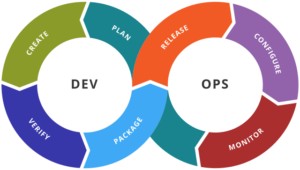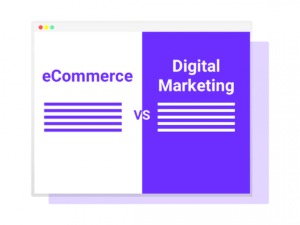Digital commerce vs Digital marketing
Digital commerce and digital marketing are two interconnected concepts that play integral roles in the online business landscape. While they serve distinct purposes, they are closely intertwined and often work together to drive sales, attract customers, and build brand awareness. Let’s delve deeper into each and compare their key aspects.
Digital Commerce:
Digital commerce, also known as e-commerce, refers to the buying and selling of goods and services over the internet or other digital channels. It encompasses various online transactions, including business-to-consumer (B2C), business-to-business (B2B), consumer-to-consumer (C2C), and more. Here are some key characteristics and components of digital commerce:
- Transaction Focus: Digital commerce primarily revolves around facilitating transactions between buyers and sellers. It involves providing an online platform or storefront where customers can browse products, make purchases, and complete transactions electronically.
- E-commerce Platforms: E-commerce platforms, such as Shopify, WooCommerce, Magento, and BigCommerce, serve as the foundation for digital commerce operations. These platforms provide businesses with the tools and infrastructure needed to create online stores, manage inventory, process payments, and fulfill orders.
- Mobile Commerce (M-Commerce): With the increasing prevalence of smartphones and tablets, mobile commerce has become a significant aspect of digital commerce. M-commerce involves conducting transactions via mobile devices, either through mobile-optimized websites or dedicated mobile apps.
- Payment Gateways: Payment gateways are essential components of digital commerce that enable secure online transactions. They facilitate the processing of payments from customers using various methods, including credit cards, debit cards, digital wallets, and online banking.
- Logistics and Fulfillment: Logistics and fulfillment are crucial aspects of digital commerce that involve managing inventory, processing orders, and delivering products to customers. Efficient logistics and fulfillment operations are essential for providing a seamless shopping experience and meeting customer expectations.
Digital Marketing:
Digital marketing encompasses a wide range of tactics and strategies aimed at promoting products or services through various online channels. It focuses on reaching and engaging with target audiences, driving traffic, generating leads, and ultimately, achieving business goals. Here are some key aspects and strategies of digital marketing:
- Audience Targeting: Digital marketing allows businesses to target specific audiences based on demographics, interests, behavior, and other factors. This targeted approach ensures that marketing messages reach the most relevant and receptive audience segments.
- Content Marketing: Content marketing involves creating and distributing valuable, relevant, and engaging content to attract and retain customers. Content can take various forms, including blog posts, articles, videos, infographics, eBooks, and social media posts.
- Search Engine Optimization (SEO): SEO is a fundamental aspect of digital marketing that focuses on optimizing websites and content to rank higher in search engine results pages (SERPs). By improving visibility and organic search traffic, businesses can attract more potential customers.
- Social Media Marketing: Social media marketing involves leveraging social media platforms such as Facebook, Instagram, Twitter, LinkedIn, and Pinterest to promote products or services, engage with audiences, and build brand awareness.
- Email Marketing: Email marketing remains a powerful digital marketing channel for nurturing leads, maintaining customer relationships, and driving conversions. It involves sending targeted emails to subscribers with relevant content, offers, and updates.

In contrast:
Digital marketing and digital commerce have different functions, but they work well together to promote the success of online businesses. While digital marketing focuses on attracting, engaging, and converting potential customers through various online channels, digital commerce focuses on streamlining transactions and giving customers a seamless shopping experience.
Digital marketing techniques are the backbone of digital commerce as they generate traffic to online stores, draw in prospective clients, and boost revenue. On the other hand, digital marketing campaigns frequently seek to increase traffic to online storefronts and advertise goods or services made available through digital commerce platforms.
To sum up, in the digital age, Digital commerce and Digital marketing are crucial parts of the online business ecosystem that work together to increase sales, draw clients, and establish brand awareness. Companies can maximize their online presence, reach their target audience, and accomplish their business goals by skillfully integrating both elements into their overall strategy.




